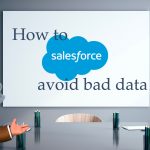Businesses are rapidly adopting data-driven cultures and tools that often leave behind different team members due to poor leadership. This can be prevented by maximizing the resources of an influential Chief Data Officer (CDO) in an organization. Having a central figurehead that is able to usher in change and streamline operations around data-driven technologies enhances a … [Read more...] about CDO Roadblocks And How To Overcome Them
Strategy
Learn everything about data strategy, what it should include in order to be successful, and how you can develop a data-driven business strategy for your business.
How to Integrate eCommerce Analytics into Ecommerce Strategy
Wondering if you could figure out well in advance what customers are likely to prefer and what pricing strategy should you apply to maximize profits? Data analytics is the key. Data has become the fuel for every industry these days and this stands true for the eCommerce market as well. However, majority of eCommerce websites fail at gaining foresight simply because they don't … [Read more...] about How to Integrate eCommerce Analytics into Ecommerce Strategy
When to Talk Salary in a Data Science Interview Process
You're interviewing for a job in data science: maybe it's your first job or maybe it's a Chief Analytics Officer role. One struggle people have is when to talk salary with the employer. Certainly, this issue isn't unique to data science roles, but I do think that there are some nuances in our field due to its recent rise and high market demand. I'll cover a few thoughts tied to … [Read more...] about When to Talk Salary in a Data Science Interview Process
How to Avoid Bad Data in Salesforce
It's no secret that data quality is important in sales. In order to make informed decisions, sales reps need accurate and up-to-date information about their customers, prospects and opportunities. Unfortunately, many businesses don't take the necessary steps to ensure that their data is of high quality in Salesforce CRM. This can lead to several problems, including inaccurate … [Read more...] about How to Avoid Bad Data in Salesforce
What Self-Service BI Is and How to Do It Right
Self-service business intelligence, or BI, has been on the to-do list of many organizations for quite a while. Marketed as a tool that allows users from non-technical backgrounds to get insights at the pace of business, self-service BI, however, is leaving many organizations disappointed when it comes to implementing it practically. Failure stories abound, with companies never … [Read more...] about What Self-Service BI Is and How to Do It Right
What is data strategy?
Data strategy, also called analytics strategy or business data strategy, is the organizing principle for an enterprise’s investments in data and data-related technologies. Data strategy provides a framework for thinking through the complex trade-offs in managing data as an enterprise resource.
It helps business leaders make decisions about where to focus their data investments and how to maximize the value of those investments. Want to learn more about data strategy? Datafloq has courses available. Contact us to get started.
How does data strategy work?
Data strategy starts with a clear understanding of an organization’s business goals. From there, it defines the role that data will play in achieving those goals and outlines a plan for how to get the most value from data. Data strategy is an essential part of any organization’s overall data business strategy.
When done well, it can help organizations make better use of their data and gain a competitive edge. But when executed poorly, it can lead to wasted resources and missed opportunities. Data strategy is not a one-time exercise; it should be revisited regularly as an organization’s business goals and needs evolve.
What are the four big data strategies?
Big data can be a big help when it comes to making decisions for your business. But how do you make sense of all the data out there? One way is to use the four big data strategies:
- Performance management — Helps you track and improve your business’s performance.
- Data exploration — Helps you understand your data and find hidden patterns.
- Social analytics — Helps you analyze data to understand customer behavior.
- Decision science — Helps you use data to make better decisions.
These strategies can help you get the most out of your data and make better decisions for your business.
What should a data strategy include?
A data strategy should be designed to help an organization achieve its business goals. It should be aligned with the organization’s overall data business strategy to be effective, considering its unique needs, such as its size, industry, and geographic location.
The data strategy should also define the roles and responsibilities of those responsible for managing the data. Finally, the data strategy should identify the tools and technologies that will be used to collect, store, and analyze the data. By considering these factors, an organization can develop a data strategy to help it meet its business goals.
What is a big data strategy, and why should companies have the strategy in place?
Big data refers to a large number of data companies have access to. It can come from various sources, including social media, transaction records, and sensors. The challenge for companies is to make sense of this data and use it to improve their business.
A big data strategy helps companies to set goals and priorities for dealing with big data. It also helps them to invest in the right technologies and build the necessary expertise. Companies will struggle to get the most out of their data assets without a big data strategy. They will also be at a competitive disadvantage compared to those companies that have invested in big data.






